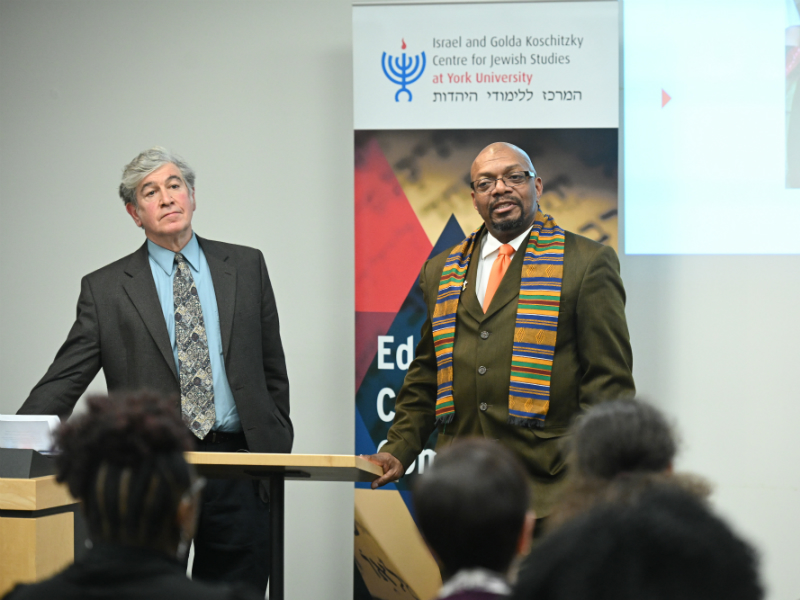Deacon Don Gathers and Rabbi Tom Gutherz have more in common than just the similar structures of their names: they are both passionate defenders of human rights and opponents of hatred; they are both thoughtful and engaging orators; and they are both religious leaders in Charlottesville, Va.
The two men spoke at York University in Toronto on Nov. 18 about the white supremacist Unite the Right rally that took place in Charlottesville on Aug. 12, 2017.
Gathers, who serves as deacon at First Baptist Church, began his talk by mentioning that 2019 is the 400th anniversary of the first recorded instance of slaves being brought to the shores of the United States. Even after former U.S. president Abraham Lincoln ended slavery, Jim Crow laws remained in place for about a century, to legally oppress African-Americans in the south. The legacy of state-sanctioned oppression continues in modern social, political and economic systems, which are still biased against minorities, he said.
And that history, Gathers said, “brings us to Aug. 11 and 12. I refer to it as the ninth gate of hell, and all of Satan’s minions pouring out into the streets of Charlottesville to intimidate us, to oppress, to physically do damage, to traumatize … and sadly, they were successful. They were very much successful.”
The Unite the Right rally took place in Charlottesville because the city was planning to move two Confederate memorial statues out of the city centre. White supremacists converged from 36 states and marched through the town chanting slogans like “blood and soil!” and “Jews will not replace us!” And, Gathers said, the marchers came armed with guns, knives, blunt objects – even soda cans filled with cement, which they lobbed at the groups of counter-protesters.
In his talk, Rabbi Gutherz, the spiritual leader of Congregation Beth Israel, explained why white supremacists are so obsessed with Jews. Leading up to the rally, he spent a lot of time trawling their forums, studying the anti-Semitic conspiracy theories they peddle. “You’ll see that they have nothing more and nothing less than a kind of Protocols 2.0,” he said, referring to the Protocols of the Elders of Zion, the infamous 100-year-old fabricated text about a Jewish plan for world domination.
“The theory of the ‘alt-right’ … was this idea of white replacement, this theory that there’s a movement afoot in every part of the world to replace the white race.” And since they need an explanation for what they call “the browning of America,” they blame it on the “nefarious” influence of the Jews.
After the rally, Rabbi Gutherz said he was forced to reckon with the role white supremacy played in his country’s history, and continues to play to this day. He thought the Unite the Right rally was an anomaly and that it did not represent Charlottesville, but when he listened to his African-American neighbours after the rally, he learned that they were used to facing that kind of hatred.
“I think that the conversations we’ve been having are about reframing how we understand this thing called white supremacy,” he said. “I’m going to say this with caution: I’ve come to think that there’s almost no event in U.S. history that could not be viewed through the lens of white supremacy.”
Neither the deacon nor the rabbi have all the answers when it comes to combatting white supremacy specifically, and hatred in general. But they believe that the interfaith organization Charlottesville Clergy Collective, to which they both belong, is part of the answer. They both advised the audience to reach across religious and cultural lines to form meaningful and impactful relationships.
“Everybody can’t do everything, but everybody can do something,” Gathers said when one audience members asked how to best combat hatred here in Canada. “We’ve found through the clergy collective … that you have to meet people where they are. Everybody on the continuum won’t be at the same place, but you can do something. That foxhole that we dug to battle this war has plenty of room.
